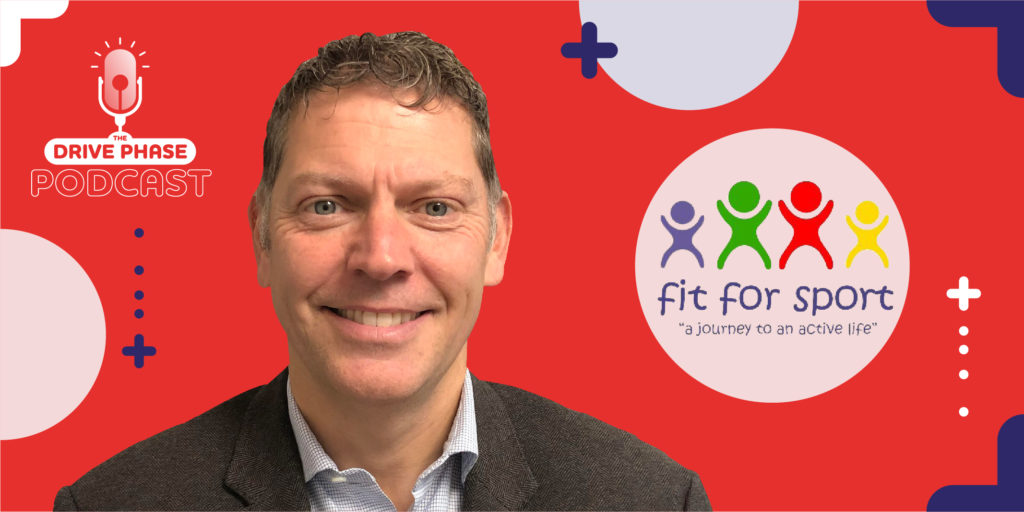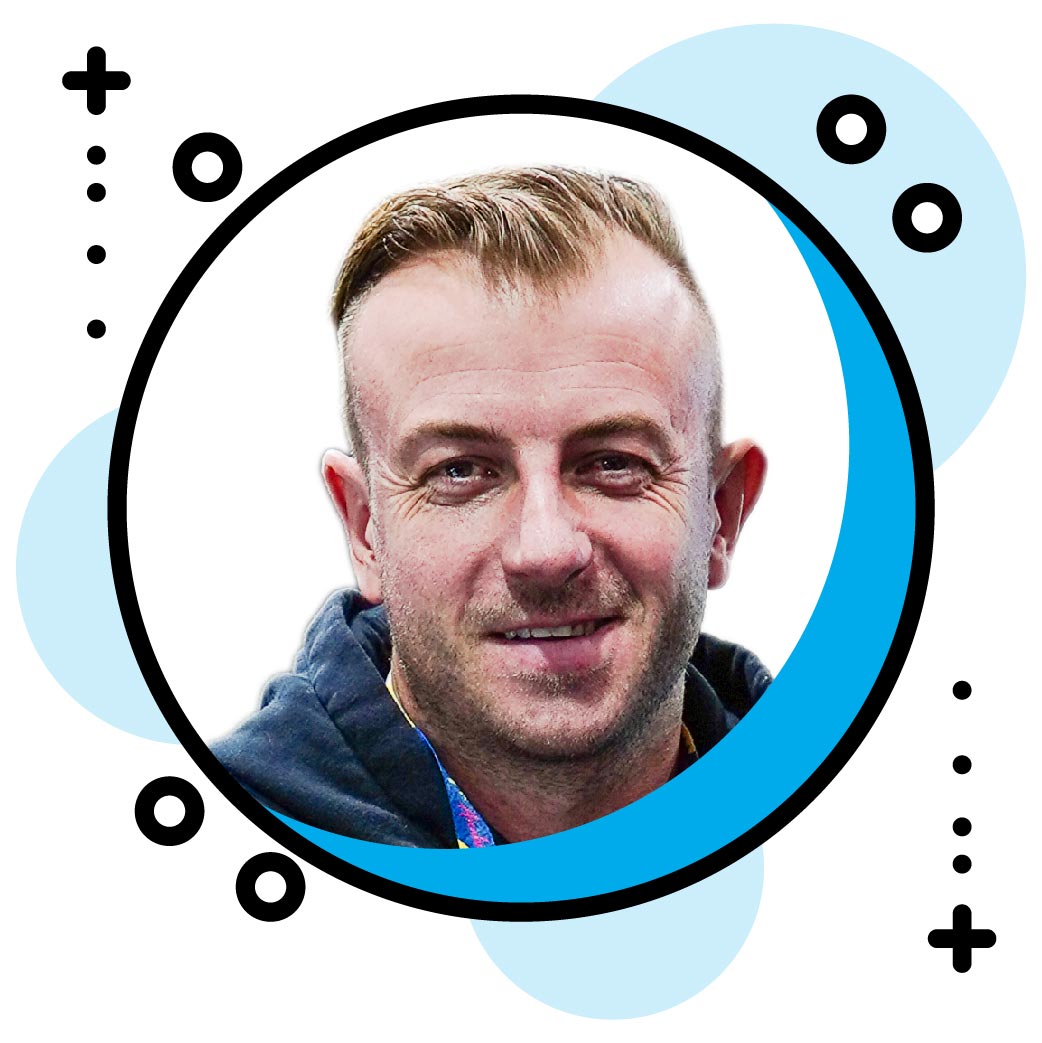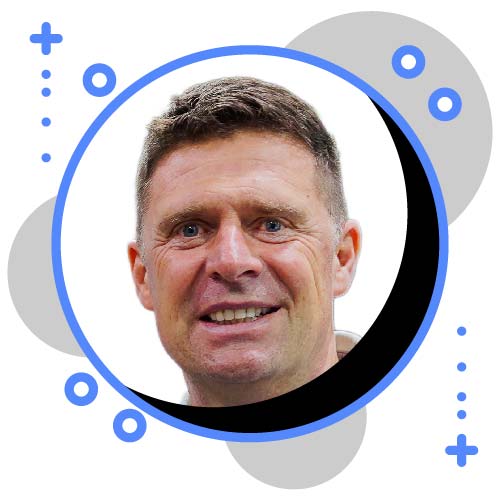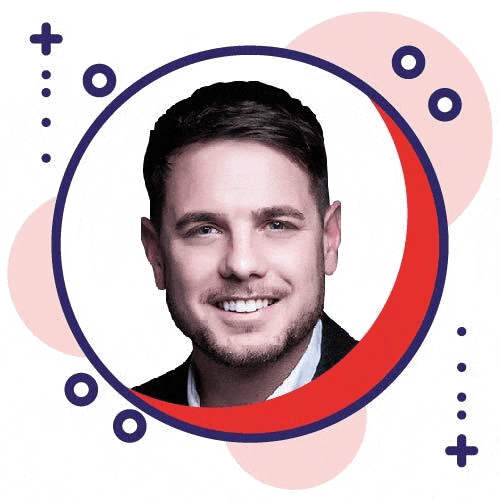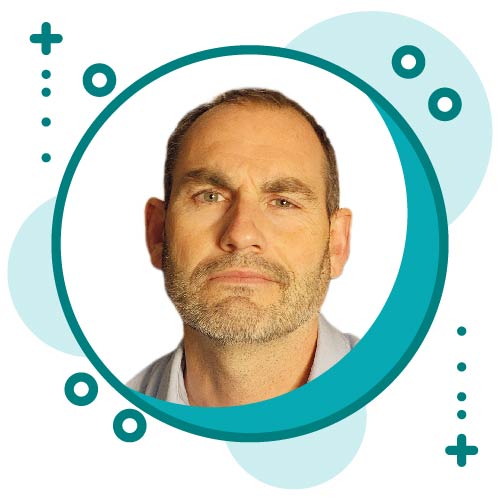Dean Horridge 0:00
What I did in the early stages was try and take in too much advice, and not be clear about my strategy, and where I wanted to be. That slowed me down by trying to please other people, including building up a board, and a senior team. But if you have a vision, and the belief as a leader, you have to strive to achieve that. Actually what I found over time was that people will follow you if they believe in you.
James Moore 0:30
From Coordinate Sport, it’s the Drive Phase, a show about sports founders, leaders and experts, and the stories behind their business journeys. I’m James Moore, and our guest on this episode is Dean Horridge. Dean has spent more than three decades in sport and education, first as a PE teacher, then building successful businesses and helping to transform perceptions about the industry. He’s the founder of Fit for Sport, the UK’s leading children’s activity provider, and a former chairman of ukactive Kids. Only this month, Dean launched the Social Book Company designed to support children and educate them about the many challenges they face growing up today. During the episode, Dean talks us through the origin of Fit for Sport, how he grew the business to impact over 100,000 children every year, employ 650 staff, and after 29 years in charge, how the business was last year acquired by the Australian based Junior Adventure Group. We hear about his thoughts on the industry as a whole, and how we can solve the childhood obesity epidemic in the UK. So get a pen and paper ready, and take some notes from a pioneer, and one of the entrepreneurs that helped to build the sector we have today.
Dean, great to have you on today. I just wanted to kick off with the backstory really. On my notes, I’ve written down born and raised in East London, and I guess you want to fill in the story from there?
Dean Horridge 1:56
Exactly yeah, it seems a long time ago but born and raised in East London. Originally from the Whitechapel area, in a neighbourhood which was a typical, community based council-run facility, where we got up to mischief and would get a little clap around the head with dad or mom occasionally to keep us in track. But I had great times as a child, going to some localised schooling. And then, when I was about eleven, we moved to Hackney road near Shoreditch, which is very different now.
James Moore 2:34
I was going to say, is it different now from what it was back then?
Dean Horridge 2:38
You wouldn’t recognise it; it’s full of trendy bars and restaurants! So yeah, very different place to when I was there, but two great areas, a lot of fun as a child. A lot of areas to get up to mischief and do what children love to do. Which a lot of times, what we try and stop children doing today; climbing trees, climbing walls, and running around on disused railway bridges.
James Moore 3:01
You mentioned your parents there, were they kind of not disciplinarians, or did they encourage you to get out and get active?
Dean Horridge 3:07
Yeah, I was the last of six, me being the last of the runt. So sort of they’ve been there done it. It’s almost an inconvenience sometimes the last one, you know, you’ve been through all the pitfalls of the other children.
James Moore 3:22
Did you get away with murder then?
Dean Horridge 3:23
Yeah, I got away with murder, it was my elder brother and sisters keeping me in check most of the time. So yeah, it was a fun time, but there was always someone watching over my shoulder, making sure we were on the right journey. And I guess a lot of times it’s the options and the opportunities you make out of life. That could have been a very different place, my environment now coming from an area like that with a lot of my close friends. Unfortunately, some are dead, some are not on a good road. But if you make the right decisions, everybody has that choice to end up where they want to go if you have the passion and desire.
James Moore 3:59
Yeah, and looking at your story, I think sport probably played a big part in that. I guess that’s for many people who’ve been successful, early age, sport and the discipline that comes with it might have impacted you. Your kind of trajectory as you came up, do you think?
Dean Horridge 4:12
Oh, very much so. I was always very competitive. As the last of six, I hated losing and still do today. I’ve three young children who have never beaten me at anything, and long may that continue. But it’s that very competitive nature of mine. I played tennis with my older brothers from the age of ten and quickly picked up the game and started to beat them, which I would get beat up for. But I love beating my brothers, and I very luckily got spotted by a gentleman walking past a tennis court, on Hackney road actually, that we cut a hole in the fence and was able to use free of charge. And he said who do you play for and what club, and I say well I don’t, I’ve never been to a club. He said you have talent, come to my club up the road called Haggerston. I never went because I thought you had to pay, and we didn’t have any money. He came back two weeks later and said to me where were you, why haven’t you turned up? I said actually, I don’t have any money, and then he said well I didn’t ask you to pay. So long story short, he took me under his wing and coached me, and I went on a great tennis junior programme with him and won every tournament for two years, including what they had as a UK London Boys Federation tennis cup at Queen’s. So I had a great career playing tennis, and I still play to date. But unfortunately, I went for a run and completely busted my ligaments, so it put me out of tennis for two years. And at that stage, all these people who I was beating were beating me very easily. So it was that time I thought I need to do something different.
James Moore 4:15
Your competitive nature took over.
Dean Horridge 5:44
Exactly.
James Moore 5:45
Just on that with tennis, I know I’m probably going off a little bit, but there’s been a bit of controversy recently around the state of tennis, GB wise and people coming up. Do you think it’s because it always had that stigma? And we’ll get into that around kids getting involved in sport, but tennis always kind of carries that stigma of being a bit of an elitist sport. Do you agree, as you said, you had that view of I’m going to have to pay to go?
Dean Horridge 6:05
Yeah, exactly, and let’s not pretend it’s not. Tennis is an elite sport still in this country, despite the hard work of the LTA, and hopefully the new CEO, Scott Lloyd pushing that forward. You have to get to the grassroots level; the talent is at the grassroots level. I had barely picked up a racket when I won my first tournament, purely for the fact there were six Wilson rackets on order for the winner. And I thought I’ve got to have these, this is amazing. Because I knew I could keep one and sell five. So I won the tournament out of pure grit and determination, not out of talent. But it shows the desire of those children who potentially don’t get the opportunity in a sport like tennis. And it’s our job really, which is why I created Fit For Sport in the first place, to make sure that we do give the opportunity to all children. It’s a passion of mine to give back what I was given as a child, which was a chance in life. I made the most of it, which is why I’m here today in the position that I’m in. But there’s a lot of children out there that have huge talent, and just don’t get the opportunity through the barriers of finances, or the elite sports and stigmatism with someone coming from a council state.
James Moore 7:13
The last thing before we move onto Fit For Sport and the reasons for launching, but touching on those school days, obviously really competitive, really talented in sport. In terms of academia, how was that for you? Did you enjoy school, and how was your experience?
Dean Horridge 7:28
I was untapped talent, I always say. Purely for one, I was a little bit mischievous and not always the best behaved, being the last of six. And then I got spotted very late in school, in my last year, that I had dyslexia. So you can only imagine my French teacher asking me to stand up and read some French out and pronounce French words to a class when I could barely understand and read English. So I was always middle of the table, I guess the top third of results, but I struggled purely because of my dyslexia. Which never held me back, but has always got in my way, understanding the school curriculum.
James Moore 8:11
I guess that’s obviously helped you to think around problems and look at things from a different angle, I suppose in business as well.
Dean Horridge 8:17
Absolutely, and I think it’s taught me from a very early age, there are obstacles, and the obstacles are there to get over, despite what they are. And that’s my philosophy in life; you deal with what you’ve been dealt. You can either step back and say that looks too high, or you say give me a leg up and let’s get over it.
James Moore 8:39
Moving on towards business, was that your first venture, the sale of the five rackets?
Dean Horridge 8:44
Exactly. My dad was probably the world’s worst entrepreneur. He had many businesses starting and failing short term, though he had great ideas, and as I say finger in all the pies. I always was intrigued to see what he was doing around his different businesses and help out. He actually opened a big business which was a factory making furniture and polishing furniture, and he did it quite successfully for many years, and my brothers continue that to date. But I realised very early on that was a very dirty, dusty job. I was the best sweeper upper and got promoted after two weeks, but it wasn’t for me. There was something better and bigger out there. So I did that for a very short period before realising I couldn’t play tennis, but I’ve always loved working with children and giving something back regarding coaching to them. So maybe that was my calling in life to start working with some younger children in and around sports.
James Moore 9:42
And then did that lead you into PE teaching?
Dean Horridge 9:45
So I started by getting qualified in tennis and squash because I realised that tennis is that sort of summer period game, and I wouldn’t have much money in the winter. So what could I do? I got coached and qualified in both sports and quickly built up a reputation for engaging children in those sports and different working environments. I then got a great job as head Pro in the Hurlingham Club in Putney, the Cumberland Club, and the Broadgate Club. And very uniquely, I never worked for any of those. I became self-employed, which they hated. But my passion was engaging the children in those settings and clubs. Like Hurlingham club, we talked about earlier the elite. They asked me to come in and get the kids engaged in the sport but try and put them in a position where they weren’t heard or seen. And I’m thinking you’ve got to be kidding me. These are your future members, what are you talking about? So mine was the loudest and engaged bunch of children. We went from eight kids in a squash section to 120 within six months, purely because it was fun and because I engaged the children. The kids wanted to come back every week and have a laugh, doing what they’re doing, as well as learning a sport. So that’s where my journey started, and that was very much engaging the children in those settings. And bringing them on a journey where you make sure that you engage all children in a fun environment. It’s very simple.
James Moore 11:10
So moving on from there, you became head of PE?
Dean Horridge 11:13
I did by fluke. A school in Kensington had heard about some of the work I was doing for Kensington Sports Centre. Which, as you probably know, was in the middle of Grenville estate. They had a lot of children around throwing bottles and bricks through their windows on a daily basis. So, I went there for an assessment, and I said it’s because you’re not engaging the children. These children see this place as an obstacle, and their way of having fun is to put a brick through your window. So they tasked me with trying to engage the children, and I quickly started with a holiday provision there engaging eighty of the local, what they call vandalism kids, in the estates. We had an amazing summer of engaging, and surprise, surprise, they never had anybody put a brick through the window or trying to set fire to the back door during those periods. A local teacher heard about some of the work we were doing because we got picked up in the press and asked me to come and assess their school in South Kensington, which I did. They said we can’t understand, we’ve got 128 children, and many of them don’t like taking part in sports and activities. And it’s very obvious to me the reason they didn’t like to take part in sporting activities was the fact that the teachers didn’t want to teach it. They had no interest in teaching this subject and no desire to deliver a quality engaging session. The thing they wanted to do was put their books in front of themselves and mark them while the kids run around fighting. So I said I’ll help them out for a few weeks, and eight years later, I had a team of three and I was head of PE. Which is my dream job, and if I had a choice tomorrow, I’d do the same.
James Moore 12:49
Would you go back to it?
Dean Horridge 12:50
I loved it. I just love being with the kids and having that opportunity to inspire those young children for a future in adulthood or life, which is enjoying being active.
James Moore 13:01
Yeah, and I think what is missed quite a lot in terms of that physical literacy point of view. I guess similar to your new project, where if you never learn to read, or you never learn to use your body properly, you’re not going to want to be active or participate in sport long term into your future.
Dean Horridge 13:18
Absolutely. Unfortunately, we get it fundamentally wrong in this country and many other countries. I do a lot of work in India, China, and Canada. But we get one chance to engage children, and if we get it wrong, it stays with them for life. If you ask anybody who’s middle-aged or someone in their 50’s, do you remember your time in PE? You either loved it because you were good at sport naturally, those 10 in every 30 children in a class who are good at sports. I was lucky; I was one of them. They’ll be the ones in the after school club, and they’ll play for teams at the weekend, etc. But there’s 20 in every class that are not very good. And if you don’t engage them in an environment, like PE, with fun, engaging activities that all can do and accomplish, allow them to feel self-worth, and want to come and do it again, then you lose them for life. You never, ever forget your best and worst teacher. And unfortunately, a lot of those worst teachers are from that PE experience. If a teacher asks you to run around the playground, we know who’s going to come first, second, and third. But we also know who’s going to come last, second from last, third from last. Every single time. We ask them to do the same thing every week, and they wonder why these children don’t turn up to the lessons and why they don’t want to do them again. It’s not rocket science. Have teams and forget the races. Forget that running around the playground, it’s not fun. Have a game of tag to warm up to children, and have some relays and balance it out. You’ll then find that the quicker kids are actually encouraging the slower kids to go go go! Then it’s a team environment. So we’ve got to get in that mindset, and unfortunately, we lose a lot of children through that PE experience.
James Moore 15:08
One thing that I wanted to get to the bottom of was the Ian Wright story. He’s a massive idol of mine, and I vividly remember the show, was it on Channel Four?
Dean Horridge 15:18
Yeah, Channel Four.
James Moore 15:19
Yeah, and I’ve got some memories of that. I don’t know whether that inspired me to get into the industry. But before we get into that, if I can take you back to 1991, you’re head of PE, and I guess it’s crazy the similarities to today. You saw the kids coming back from the summer break and maybe not being as fit as they should be. But now we’ve got the whole nation in lockdown for such a long period, and they’re all coming back to school now. So it’s come full circle 30 years later.
Dean Horridge 15:46
It has, unfortunately, and it’s probably going to be even worse now. As a head of PE with children coming back in September, I found myself wondering, what on earth have these children been doing over the summer? So I did some research and some focus work with parents and realised they’ve been doing nothing. Parents thought it was a time for rest and a time for inactivity. But, and I don’t know about you, James, several weeks off doing nothing doesn’t do much for your fitness levels. So I said, that’s not good enough. There are many children not doing anything at weekends, after school, and certainly not in the holidays. So I started a company called Fit For Sport, which was always a passion of mine, to get children fit to play sport. That was the ethos of the early days, of the engagement. I started with a Saturday morning session that had two kids, and by week three, it had 40 kids and a three-month waiting list. So I realised quickly there was a market for it, and I just expanded on that by having more clubs and hiring more coaches. In those days, there were pretty much no providers around offering this sort of service. It quickly expanded to something where I had to make a decision, whether I wanted to have the salary of a head of PE or take a chance on operating a business. Which in those days, had the potential to expand very quickly. So I resigned as the head of PE reluctantly and started Fit For Sport.
James Moore 17:15
I’m looking at the first milestones, and you answered this question already, in terms of having a couple of kids the first week and then rapidly going to 40 kids and long waiting lists. How did you go about it; did you have a business plan? Did you think right, we’re going to expand this way, this is the strategy?
Dean Horridge 17:35
Good question. In the early days, it wasn’t really about a business plan. I was thinking about how am I going to cope with the bigger issue, which a lot of your listeners and small business owners may have. Which is when Mr Dean is not there, does the quality, enthusiasm, values, professionalism, and desire etc. remain? And that’s the biggest challenge of our sector, making sure that in those days where is there another Mr Dean? Because when I wasn’t there, my 40 went to 14. And I quickly realised that we’re only as good as the last coach or the last child in our setting, which hasn’t changed to date. Therefore, it was my job to come up with the training and support programme for inducting and engaging those staff. Supporting them on a journey to be able to deliver high quality, but more importantly, engaging environments for the children. Where the children had no idea that they just run two miles in an hour and a half session, they just thought they were playing games and having fun. And that’s the key to success. The children are simple; they want to do things that are fun. And unfortunately, I had a lot of coaches in the early days that thought it was a good idea to talk 20 minutes about a tactic and technique. And I realised no, I couldn’t give a damn how this child is holding a hockey stick, just get him running around the cone with a ball as many times as they can and high five them.
James Moore 18:37
Yeah, they need to be active.
Dean Horridge 19:12
Yeah, and there’s a big difference; they’ll feel they’ve achieved something. If you spend 20 minutes talking about technique, half the session is gone. You’ve lost half the class, and only 20% is going to be able to do it properly anyway. It’s wasting your time.
James Moore 19:26
So with that induction, I guess that was you setting those operating standards?
Dean Horridge 19:33
Yeah, exactly. So I came up with some values which remain today, and I tried not to employ people who didn’t portray those values. And they’re values like professionalism, being able to be a role model, and have fun. The most important thing is the staff have to have fun themselves. If you’re laughing and running around like an absolute fool, the kids love it, and they’ll do the same. And you have to be professional; you have to lead a healthy lifestyle. Most importantly, people have to trust you. You get one chance with children, and if they don’t trust you, you’ve lost them. But that comes in many aspects because you also have the parents. Don’t forget, in this sector somebody goes online and books a child, which is the most precious thing in the world as far as I’m concerned as well as many parents, and they leave them with a complete stranger. Sometimes, for full daycare. And that’s sometimes overlooked, the trust that parents have to put into our sector and our staff that we employ to deliver childcare, sports, or other services to these children. It can’t be underestimated. You’re leaving your precious gem with somebody, you actually have no idea what they’re going to do.
James Moore 20:47
I suppose two questions on the back of that, so 29 years of running the business day-to-day, but did you have any recurring challenges? It’ll probably be staff, I guess, but maybe something else that’s always coming up? And how did you deal with those as you grew?
Dean Horridge 21:08
Yeah, in any operational business, staff is always the number one challenge. And then also cash flow. When you’re growing so quick, as I did, cash flow is always quite a big issue. But a lot of those areas we’ve come a long way from when I started to now. We have many small operators now having to rent an online booking system. When I started, it was cheques. I don’t know if you know those James.
James Moore 21:40
You know what, when I found out you got charged by the bank to deposit cheques, that was an eye-opener for me.
Dean Horridge 21:48
Exactly, so there was a lot of admin required outside of actually running and delivering the business. And in the early days, as a business owner knows, you have to work seven days a week. You have to do everything yourself and put in the hours to be successful. I suppose the biggest challenge was coming to a point in time where there were no more hours in the day that I could give. And so, I had to think, well, how do I build up a team around me to support me? Whether that’s operational, accounts, and of course, what comes with that is a cost. So you have to be thinking about how much can I grow? How much can I save on my time to build the business if I bring in someone to take that off my hands? So you’ve got to be very clever about the way you approach that. It’s always a very big decision for many people in taking that next step. But my advice is you never know until you’ve tried, so do it.
James Moore 22:45
In terms of cash flow, have you ever took any kind of outside investment?
Dean Horridge 22:51
Yeah, we were pretty much the largest by far at the end, where I had something like 650 staff, and foolishly I never borrowed a penny. Would I do it again? Never. If you could see how many nights I’ve had walking up and down my house thinking, this is on the line. So in hindsight, I would look for some investment to make that opportunity for growth a little bit easier. But I didn’t take any investment until very late when we were looking at the sale and acquisition side of moving Fit For Sport to the next level. And the banks were always very supportive because I had a good track record, and I think I was very open and transparent with my position. So we made money to grow, and I think that’s the way I did it. But I do it a little bit different these days with my new businesses.
James Moore 23:46
Interestingly you said that was 650+ staff. It’s not a franchise operation is it?
Dean Horridge 23:52
No, and many people have always said to me, why on earth would you not take the market share of the franchise? I tried franchising, I spent a lot of money having a franchise model, and we still have it to date. I tried it, and I didn’t like it. I’ve just never been a big fan of franchising. I think you lose a little bit of control, a little bit of quality. Unless you have people so passionate about what you want to deliver with the values, I go back to my values, it just doesn’t work for me. It works very well for some other providers out there, but I just didn’t sleep well at night thinking that we were a franchise. I like the ownership factor.
James Moore 24:32
Yeah totally understand. That leads me to my next question, what are the myths or misconceptions of the sports industry? And this is sports coaching industry specific, really trying to push your buttons, maybe the stereotypes that get put onto providers or organisations?
Dean Horridge 24:51
Yeah, don’t get me started. My biggest issue is that with this sector, and I hope it’s changing a little bit now with the work I did as chair of ukactive Kids, it’s seen as just a sports coach scenario. You hear many people that work with governments saying this industry is full of ‘white van man’ people with a bag of balls, and it is. What frustrates me is people look down on the profession and think it’s unprofessional, that they don’t have qualified people. They think it’s just someone who doesn’t have a lot of qualifications that becomes a sports coach, but it’s totally the opposite. I’ve employed many people over the years with degrees coming out of their ears. It’s a hugely impressive industry with multi-talented people. My frustration is that it’s not recognised yet as a true profession, which supports millions of children and changes lives. That’s got to change, and the work that CIMSPA is doing at the moment, they’re going to hopefully really move that sector forward with a recognised qualification minimum standards. But we as a sector need to work better together. We’re so segmented, and there’s not so much collaborative work, especially alongside the government. Yet we play the biggest impact if you look that 87% of schools use an external provider.
James Moore 26:23
I didn’t realise that was the stat, 87%. Do you think that’s down to the funding? Or do you think that’s core because you started a long time before this was before the sports premium funding was in place?
Dean Horridge 26:34
It comes down to one fundamental issue, which I can say now, not being the CEO of Fit For Sport anymore. It’s the perception that these activities around PE and sports clubs should only be delivered by qualified teachers, which is still a government position with the support organisations they work with. I go back to what I said at the very beginning of this interview. The reason I got into teaching PE was I saw what teachers were delivering on a PE scale. They did not want to be there, they hadn’t been trained, which was so disengaging, and it has not changed today. So why the government sit there and say who should be delivering these sessions around PE in different sports environments at schools should be qualified teachers is beyond me. It’s so incorrect. I get it should be teacher-led qualification wise, but there’s no reason why a qualified sports coach cannot deliver side-by-side with a qualified teacher in environments like PE. Someone has to have the enthusiasm, engagement, and desire to make a difference for those children. Unfortunately, as a governor at a school myself, many teachers today still do not want to deliver that subject.
James Moore 27:51
From my own experience, it seems like teachers roles are getting harder every day, with more and more work from different angles. And PE, if it’s not your passion, it’s going to be hard to be motivated to deliver it like it is, I suppose.
Dean Horridge 28:06
Absolutely, and you can’t blame the teachers. They’ve not come into teaching to teach PE or an after school club. They’ve come into teaching because they have a passion for teaching. And so some teachers love it, the very sporty teachers. But you get someone come in riding the bike, and the head says you look sporty, you could be my head PE. And that’s the way it works. Thirty years later, from when I started, it hasn’t changed. And for fundamental change in our sector and our industry, and for our ability to engage our children in the subject matter of Physical Education, that needs to change.
James Moore 28:43
Quite right. In terms of that primary PE angle, there’s this focus around childhood obesity which is an issue we are currently facing. It seems to be increasing, and I want to get your take on that. The Dean Horridge model of fixing that issue across the nation. Do you have any thoughts on that?
Dean Horridge 29:03
I do have some passionate thoughts. And I’ve done my soapbox around the world with my thoughts on this. I’ll try and keep it brief, but I go back to 29 years ago when I first started, and we had quite a few children in that school that were a little bit overweight. Two years later, we didn’t have one child that was overweight, forget obese, overweight. Why was that?
James Moore 29:27
Sorry that was in two years?
Dean Horridge 29:28
Yeah, two years. Every single child in that school did a minimum of one hour of activity a day. So all the children had to sign up for an after school club three times a week, and all had to be active at lunchtime. It’s not rocket science. The recommendation, the chief medical officer guidelines are one hour a day of 60 minutes of moderate to vigorous activity. Now, the definition of moderate to vigorous, let’s keep it simple. You’re out of breath, and you’re sweating. Do you know how many children go out for that wonderful time of lunchtime activity in school and sit down and read a book? Or sit down and have a bag of crisps, or not even move? And we have an environment where we ask children to get up in the morning and have breakfast. Most get driven to school or don’t really do much walking. They go into school, and they’re asked to sit down and listen. They go out to the playground, and they’re told not to run or use the skipping ropes in case someone gets hurt. And please don’t use a football, god forbid, someone may get hit. Then they’re asked to sit down and have lunch. After school, they do their homework, and sit down and chill out on their games, and go to bed. And we wonder why we have obesity issues? We’ve got to get the kids moving. We have an hour a day recommendation, yet the minimum that schools have to deliver is two hours a week. I don’t know about you James, but my maths has always been quite strong. Five hours recommendation in a school week, and only having to deliver two, you’re setting yourself up for failure. So this whole perception around getting kids active needs to be addressed in all schools that actually your job is to get the children active for an hour a day. Yes, 30 minutes are in school, 30 minutes are outside of school. But you know what? Schools provide both environments, as I did 29 years ago, which was in school activities everybody’s active. Including in class, stand up and do some fun activities. But also after school, every child should have the ability to do an after school club. Unfortunately, we don’t have that in school settings because there’s a charge to it, and many parents like mine when I was a child could not afford it.
James Moore 31:37
Yeah, and I guess going back to your childhood and probably mine in terms of society as a whole, certain things that we could do as kids you generally can’t do now. Like you said, people getting dropped off at school. I used to walk to school when I was 7-9 years old and play out in the street. Or cut a hole in the tennis court walls, and that type of stuff seems to be disappearing. Yeah, it’s becoming more structured, and we’ve got great coaches working in the community, but the day to day more active lifestyle seems to be diminishing.
Dean Horridge 32:08
Well, there is no fun, and there’s no time in school lunchtimes in many schools, not all schools but many schools, where the children could just let rip, go wild. If I didn’t go running around for a half-hour by lunchtime at school, I’d be off a roof. And many children don’t, and then we tell them they’re naughty, right? These children are misbehaving. No, no, no, they’re just like a puppy in a cage. You have to let children run and exert that energy, which is built up from being sedentary. And I think the other environment that we have to be very careful of is homework. I’ve got three young children, but I’m going back a few years when my children were seven and eight. They used to come home from a whole day at school, getting home at 4:00 – 4:30 and sit there and do two hours of homework, which is just insane. Because first of all, some of the statistics around additional learning doesn’t come into play because the children are just whacked by then. What is more interesting is how much children learn better when they’re active. And somehow, as a sector, we have to find the balance to go back on this education establishment to say active children learn better. Active children behave better, active children sleep better, active children eat better, I can go on. Yeah, we have a lot of inactive children around the UK.
James Moore 33:26
Yeah, which leads me on, I was going to ask you a question about your routine. So in terms of your leading a business, going from no employees to 650, I’m assuming you used certain routines and tactics to help you with your performance as a business leader? I’m guessing that included exercise?
Dean Horridge 33:34
It’s a good call. My wife will tell you very clearly if I don’t exercise every other day, she’ll lock the door and leave me outside. I’m someone who has always been active. I’m still in the gym three times a week, and I play very hard tennis for two hours without breaks on a Friday. And I’m very active with the children, family, and dogs all weekend. If I’m not active myself, I’m just insanely built up and can’t sit down. So I’m not just energised, it’s a part of my routine, and I love it. My best thinking time where I come up with my best initiatives, including the Ian Wright support group, has come from being active. Doing an activity and then going in the sauna for 20 minutes. I just wish someone would invent a pad that doesn’t run when you write something down in the sauna. But my best ideas come from being active and then just having a chill-out time afterwards.
James Moore 34:54
I know you mentioned Ian Wright, and as I said, he’s one of my idols. I’m an Arsenal fan, so growing up, he was a bit of an inspiration for me and probably is for many people my age. How did that come about?
Dean Horridge 35:03
I got a call from the documentary makers, who said they were thinking of doing this programme. Because obviously, obesity was big in the news, and it hasn’t really gone away. They wanted a celebrity to work with these children and had heard about the work I was doing, so they asked if I would be the consultant to work with the programme. And I said, well, depends who you’re going to get to be the celebrity. And they said we had a few in mind, and Ian Wright was one of them. So I said that’d be cool, but what is the programme? What is the ethos, what do you want to get out of it? So I met the director of the programme, who explained basically we’ve got these overweight children, and we want Ian to be their Sergeant Major. Really grill them and show the nation how unfit kids are. So I said no, I’m not interested. If you’re going to put these children down, these overweight children making them feel crap about themselves for TV purposes, I’m not your man. I said I would work with Ian and show you how we can change these children’s lives. I’ll show you how we can actually get them smiling and feeling good about themselves again, which I don’t know if it’ll make good TV, but I’m sure there will be some moments along the way. And so we end up agreeing in some form of in-between. So I met Ian, and I said just to let you know, this is the way I want to do things. Because he was the face of the programme, but as you’ll probably know, James, I did all the work. We hit it off very quickly, Ian and I. And he’s a lovely guy, very genuine. One thing I like about him, he says what he wants to say. And that’s what I’m like, I don’t like greyness. You ask me a question, I’ll tell you the answer whether you like it or not, and he has the same mindset. It was during the World Cup filming, so he was a lot of times not around with the children, but we worked extremely close with them. And of course, what you then find out being so close to the children is there are more issues with home life than people first realise. Which is probably a lot of the reason why they are feeling so bad about themselves and overeating. But they were a great bunch of kids, and I was engaged with them many years after the programme trying to support the children. I even employed a couple of them along the way.
James Moore 37:16
Great story. And I bet it couldn’t have hurt at the time raising your profile for helping grow Fit For Sport as well.
Dean Horridge 37:24
It raised a lot of profile. Though, when we got the first screen, it had to be cut again because there was too much Dean’s face in the programme for the directors liking, as Ian wasn’t there a lot. So we had to recut a lot of the stuff, and they took me out because it just looked silly. Like it was an Ian Wright show, and yet every shot, you’d see me there because I was with the kids all the time. Which is a shame because I thought I had a face for TV, but maybe it’s radio. But that was fine, I wasn’t precious about being on the TV, and it did give me a high profile image working with Ian and the team. But it showed the seriousness of the obesity issue that we had, which was more important for me to get the nation realising we’ve got to do something about it.
James Moore 38:10
Definitely. Moving back to business, I’m interested to hear about the kind of SaS concepts you’ve developed, growing Fit For Sport. Which I’m assuming you’re going to be implementing in the new venture as well. But could you talk us through that a little bit? I think our listeners will be interested in that. I might even be stealing that one myself.
Dean Horridge 38:31
It’s almost what I started from day one. I made the decision to start a business, and as everybody does, I did a bit of research and looked at what’s out there. Of course, there was no real sector out there from what I could see. But you had people saying you’ve got to write a business plan, you’ve got to do this, and you strategise here. And then I spent six months doing all these papers and business plans, and they were pretty much dead after four months because the business has changed so much. And I would do them again, and again, and it took me about a year to realise, why am I overcomplicating this? So I came up with the way I employed and trained staff. Textbook style? Well no, our staff are visual and hands-on, and they learn from watching someone like myself engaging the children in those environments. So I came up with this simple, achievable, sustainable approach. There were so many things that I was doing at the early stages that weren’t simple and weren’t achievable for many people. It certainly wasn’t sustainable, and I just thought what a waste of time that was, doing what we’ve just done. Yet not many people can achieve it, and we’re not using it now. So the SaS has stayed with me through life, and actually what I do is use it in my personal life as well. Anything I do with business, or personal, I always think is that simple, is that achievable, and is that sustainable? And if it falls into those three categories, I’m all in. If it doesn’t, it’s time to rethink.
James Moore 40:14
Yes, it’s interesting because I think when starting a business, trying to grow and wanting to be seen as professional, you tend to overthink things a little bit.
Dean Horridge 40:21
So much, and you know what, you listen to a lot of people. Which is good, you learn from people. But a lot of the time you listen to too many people. There are too many options, and it becomes so complicated. Not achievable, and certainly not simple. Which always leads to it not being sustainable. So my advice is those three things are fundamental to any decision you’re going to make, certainly in business.
James Moore 40:49
And what would you say in terms of running a successful business at that scale? What would you say the keys would be? I know you touched on your building that team, originally. Are any of those guys still in the company and on that journey with you? And I guess that’s down to your values, isn’t it.
Dean Horridge 41:05
Yeah, I’ve had people work for me for many years. We’ve got people retiring now, which is scary. So I’ve had people working with me for over 20 years, which is crazy to think that you can stay in employment these days for over two. In fact, I’ve taken a couple of staff that have been with me 16-18 years. As I said, my way of managing my business has always been open and transparent; my staff know that they can trust me. If they ask me a question, they’ve always got to be prepared for the answer because it will be a truthful answer. I don’t like hiding behind a lie, so like it or not, that’s what the answer is. You get a lot of respect for that, and I think in building a business, you need to have an understanding of where you want to be in the short and long term. For me, the long term is something you don’t want to spend too much time on. Because the world as we know is always changing, who knew code was coming in, right? There’ll be something else in the next 5-10 years, no doubt. So the long term vision is always something you have, but to drive that with your ethos of the team is something that people don’t really get. So that short term for me is all about ownership and buy-in. It’s very easy when I walk into the office, and I see a piece of paper to pick it up. And people say, why did you pick that up? You’re the CEO, you’re the owner, you’re the founder? I’ve always had this philosophy. I’ve never asked my staff to do anything that I wouldn’t do. And any good leader, in my view, leads by example. And yes, money plays a part in paying people’s salary, but if you get people working for the cause, the belief, for someone that actually will do anything they are going to ask you to do, it makes a big point of position and buy-in. Ownership is key. It’s very easy for people to say it’s not my job.
James Moore 43:21
One thing that’s coming across the industry as well is that the mission of the company, what you’re trying to achieve, is positive right? It’s getting kids active and helping them live a healthier life, which is probably easy to get behind. So with that combined with your leadership, you can see why people would follow you and your goals.
Dean Horridge 43:45
Unfortunately, you’ll probably know as well as I do and a lot of your listeners that you potentially have businesses who think working with children is so easy and so fun. It’s just kicking a ball around. That’s great, and I get paid for it, amazing. You don’t know how many people have come into my organisation with the most qualified people in the world, and you put them in front of a child, and they say wow, this is not for me. You have to have a passion. You have to have a desire and a belief that you’re making a difference. And you sleep well at night, knowing that you potentially changed a child’s life for the better, to really understand this industry and thrive in it. Working with children all day, I tell you now, is not easy. It’s hard work. When it’s raining, and it’s cold outside, you’ve got your hat and your gloves on, and the kids are not listening. It’s hard work. But you know what? At the end of the day, you’ve got to smile about it and say, well, at least I’ve made a difference to Johnny, who’s for the first time engaged in the sport for example.
James Moore 44:54
I think everyone’s had a bit of insight into that during lockdown, doing the whole homeschooling thing. So, one thing I’m really interested in is you’ve been in Fit for Sport for 29 years, and then earlier this year, you stepped down as active CEO. How was that for you? I guess you spent all those years building a business. I know you’re still involved, but was it time to do it?
Dean Horridge 45:23
Yeah, I’m still a director of the Junior Adventure Group, which is the mothership from Australia, Singapore, New Zealand, Ireland, and now to the UK. And there are still lots of plans to grow. I’ve been approached by various groups looking to get into the sector. Because it is an exciting sector, there’s always going to be kids, always going to be a need for additional childcare or sports for those children. So the sector is flooded with small operators, and I’ve been approached several times. I came up to 50 last August, and I’ve always had my dream to be at the position where I didn’t need to worry for a while, let’s say. I think I came to that 50 bracket, and we were approached by this group and there was time to engage in conversation, so we sold back in October last year. I remain on the board at a strategic level, trying to steer the new group in the UK to the next phase of events. So I’m very passionate still that I make a difference. But it was time for me to let go of the reins and let someone take it to the next level. You know, I’m very open and transparent. I’d say I took it to a point in time where it has the potential to go even further. And I know my limitations. I know where my strengths lie, and it wasn’t to take this business to that phase, certainly on a global scale. So it was a very easy decision for me, though hard on the heartstrings, of course.
James Moore 47:01
So from that, you’ve launched the new venture, and I guess going back to the startup phase again. So back to 100 hour work weeks, you’ve got the Social Book Company. Do you want to fill us in?
Dean Horridge 47:19
Yeah, so it’s always a good time to start a business during lockdown. But I was approached by my co-founder about this venture, and we discussed it, and he came up with the idea of these online books and resources to support children. I thought about it for some time and said, actually, I think we could turn this into a business. So it’s called the Social Book Club, and in essence, it’s an online library, educating children on the difficulties they face in the world. So very much still supporting children and young children. And what we do is we create, we write, and we illustrate the books ourselves, as well as having authors around the world, in subject matters that supports PHSE in school. But more importantly for me, topics that children find very stressful and cause anxiety in a world we live in today, like bullying and COVID. There are lots of subjects that not only parents but also schools find difficult to talk to children about. There are books on recycling, and we think a seven-year-old knows what recycling is about? Well, a lot of them think it’s a blue box you open and put plastic in. But there’s a lot more to it, so we illustrate the books in a child-centric way. It goes through the story of why we recycle, and it’s got a turtle in there, and what could happen to the turtle if we don’t recycle, and the kids get it. So that’s educating the children, as well as providing virtual workshops for schools supporting them on those difficult subjects. So it’s a very passionate, very difficult time to start a business. We’ve got some investment upfront, which has helped us and who knows, it could be a global sensation because it can work in any country that speaks the English language.
James Moore 49:03
Yeah, I’m sure it will be successful. In terms of just digging a little deeper into the service, you said it was online books. Is that on a tablet? How do they access that?
Dean Horridge 49:19
Yeah, good question. It’s a subscription-based model, so schools will sign up to get all-access to up to 200 books that they use as part of their learning for the children. A parent can sign up for £7.99 a month, and have access to the same books and same resources, so they could support the children through home learning. So very low-end sort of subscription-based model. We’re also looking for partners, so if any of your listeners can database with parents that think this is a great way of supporting their children, which it is. We’re launching next week with Waitrose as our first partner, and we’re talking to Virgin and Sky. We’re open to moving those forward supporting this because it’s a great employee benefit for one. But also, it’s a great initiative to broaden out to people’s databases, and our model’s very simple. If you sign up someone tomorrow for £7.99, you get £2 of that £7.99 per month. So for a partner supporting this sort of initiative, it’s a good revenue stream if you have a good database.
James Moore 50:20
100% and I’m sure many of our listeners would be interested in that obviously, with the work they’re doing in the community and with families. So if we wanted to set that up, how do they contact you for that? Is it through the team or the website?
Dean Horridge 50:33
Yeah, go to thesocialbookclub.com, you’ll see the website, and you can have a look at our contact details there. I’m more than happy for your listeners to get my details and talk to me directly about opportunities. Or even just with questions following this interview now, I’m always open to supporting people in the sector. So please, have that as an option.
James Moore 50:53
No, fantastic. Just to finish off, I’ve got one question that hopefully you’ll enjoy. Looking back when you started the business, or say in your 20s, if you had the opportunity to go back and speak to yourself then, what one piece of advice would you give yourself?
Dean Horridge 51:23
Good question. I’m a very determined person, and I think a lot of times, the best bosses in the world absorb the good work that the team do around them. What I did in the early stages was try and take in too much advice, and not be clear about my strategy, and where I wanted to be. That slowed me down by trying to please other people, including building up a board, and a senior team. But if you have a vision, and the belief as a leader, you have to strive to achieve that. Actually what I found over time was that people will follow you if they believe in you. So that advice in those support systems are great, but you as a leader need to have the belief, desire and understanding, and a clear message to anybody that you want as part of that team and journey.
James Moore 52:16
Thanks for that. I really appreciate your last answer there, and I think we can get a lot of insight from that. And thanks for your time today. I’m going to wrap up there, maybe next time, we could do it in person, and you can take me on the tennis court and show me how to play.
Dean Horridge 52:29
Definitely, I won’t let you win, that’s for sure.
James Moore 52:32
I’ll start training now.
Dean Horridge 52:35
Great to speak to you James.
James Moore 52:36
You too, Dean. And thanks very much, I appreciate it.
Thank you for listening to this week’s show. You can subscribe anywhere you get your podcasts. If you’d like to get in touch with us, you can write to us at drivephase.podcast@coordinatecloud, tweet us @coordinatesport or follow us on Instagram @coordinate_sport or on my account @james_ventures. This episode was produced by Nancy Kwamboka, with support from Claire Goodchild, and Lola Small. And a special thanks to Rochelle. I am James Moore and you’ve been listening to the Drive Phase from Coordinate Sport.
